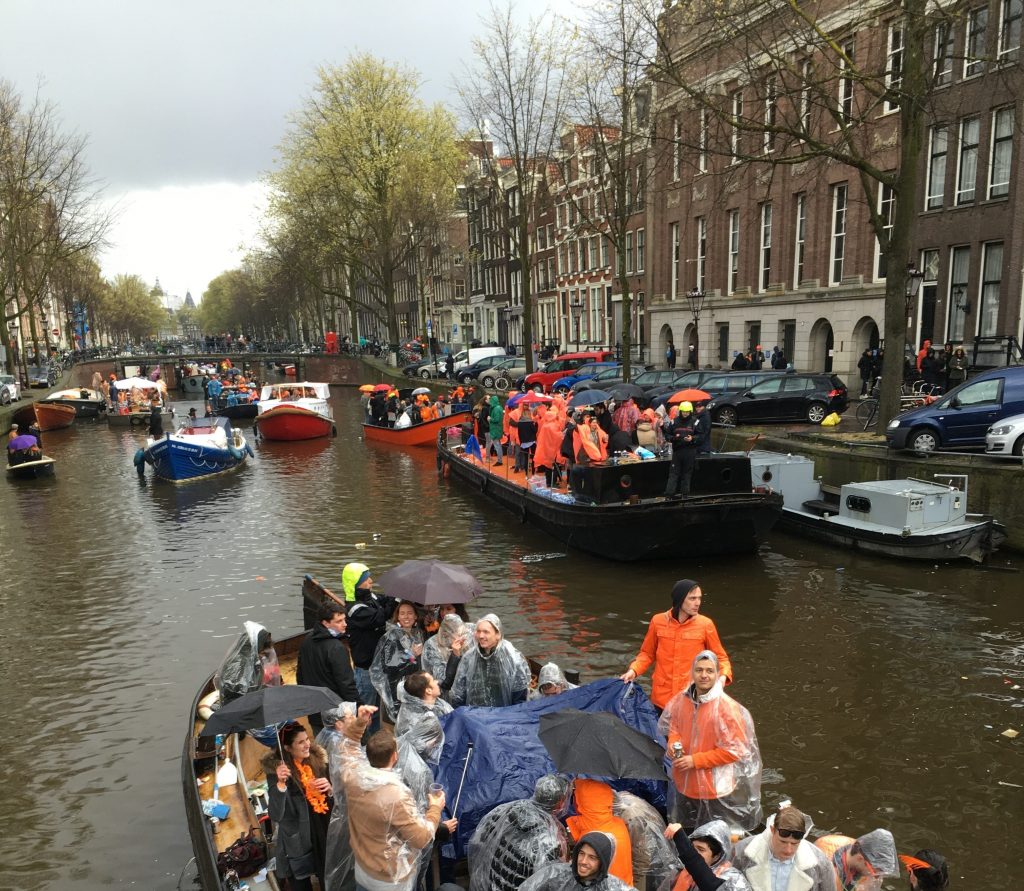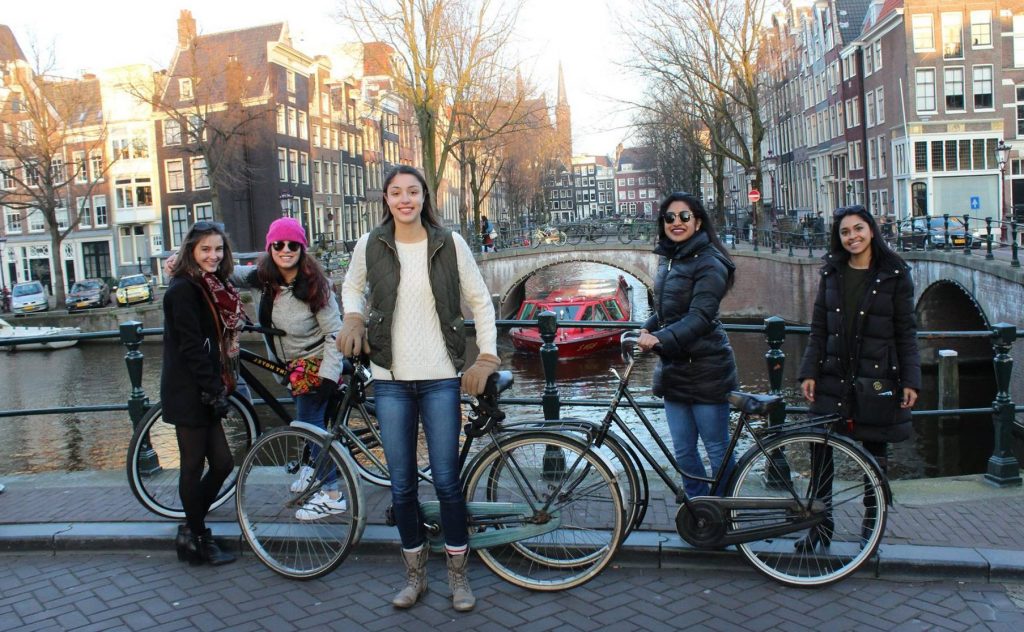A TRIP INTO DUTCH LIVING
Realizing New Vistas
Tasneem Ahmed (CLAS '17) Interviewed by Ellen Yang (CLAS '18), Student Writer
October 1, 2016
Amsterdam, the capital of the Koninkrijk der Nederlanden (the Kingdom of the Netherlands), is a vibrant metropolitan space in the province of North-Holland that is constantly bubbling with life. With its canals winding throughout the city, tall and open windows inciting a sense of openness and relaxation and its refreshing architecture and unique bikes lining every street, this historical hub entices millions to its downtown every year. Tasneem Ahmed (CLAS '17), Economics and Human Rights double major, took off to this European metropolis in the spring of 2016 to fulfill her semester abroad at the University of Amsterdam. Like UConn, its exchange partner the University of Amsterdam is a member of Universitas 21, a leading global network of research intensive universities. Little did Tasneem know, the inspirational journey that awaited her would lead to an astounding new understanding of culture, the world and herself.
What gave you the idea to go to Amsterdam?
Since I'm interested in development work, poverty alleviation and international markets, I wanted to find a truly global location for my semester abroad. Amsterdam is one of the world's most international cities, so it was the perfect choice for me. Additionally, every single one of my friends who had traveled abroad to different cities in Europe recommended Amsterdam to me as their favorite. Its central location and well-established connections also made it easy to travel around Europe from there. As I was looking for personal enrichment, I could think of no better place but Amsterdam to experience that.
What did you find interesting about studying in The Netherlands?
 It was very interesting to see how the education system was quite different from ours. There, they really value and put an emphasis on leisure time. Before living in Amsterdam, I was very tied to the "work, work, work" way of living; but there, I learned how valuable our time is, and that there are many other ways by which to spend it. In the Netherlands, the way in which work ethic and culture come to a work-life balance is truly something for us to learn from and to strive towards.
It was very interesting to see how the education system was quite different from ours. There, they really value and put an emphasis on leisure time. Before living in Amsterdam, I was very tied to the "work, work, work" way of living; but there, I learned how valuable our time is, and that there are many other ways by which to spend it. In the Netherlands, the way in which work ethic and culture come to a work-life balance is truly something for us to learn from and to strive towards.
Studying in the Dutch education system also helped me appreciate the US a lot more. We were expecting our studies to be very difficult, but in some ways they were not; I actually found the US curriculum to be more rigorous, the Dutch system requires students to be more independent in their learning. At the end of the day, I personally do learn a lot more the way I am taught here in the US, especially because we tend to have more support from professors, which is helpful.
Did your experience challenge expectations or reveal common misconceptions of the Dutch?
Yes, some people misunderstand Dutch bluntness, but I found it to be refreshing. Also, some think that their is a general anti-foreigner attitude but again I found this to be opposite of the truth. I felt that they really loved foreigners. If I appeared confused, walking around aimlessly, locals would want to help me. If that happened while I was on my bike, they would say, "Come with me!" and then lead me to my destination on wheels. All these interactions made me see how much the Dutch appreciate the opportunity to learn from and engage with other people. And, the bikes have definitely lived up to the hype. The bikes are the coolest things in Amsterdam. The Dutch are so open-minded and don't have any social barriers. For them, basically everything is okay. They are very trusting people and are open to new experiences.
What was the most important part of your experience abroad?
My friendships were definitely the most integral part of my experience. I was really lucky to immediately find some friends who were from very different backgrounds to my own. One best friend was from Switzerland, another from Australia and two others were Dutch. Coming from different parts of the world, and having the opportunity to engage in conversation, brought three or four different opinions to the table with each new burning topic. I learned a lot from their different perspectives and now really consider the way that we think about things in the US. Also, these friends are a really great network to have.
What new perspectives did you learn from experiencing Dutch culture?
Dutch culture is pretty unique. The people are very straightforward, blunt and candid about their opinions, which I really appreciated. There was no political correctness frowning upon us. Some of the conversations I had there were ones that I never would have had here in the US even with best friends, just due to the way the topic was being framed.
It was also interesting how the Dutch are a little more worldly than many of us in the US are, including myself, even though I had studied international affairs. I really appreciated how much they knew and cared about the politics and cultures of places all over the world. They're very knowledgeable.
How has your perspective changed since returning to UConn?
 Now I read the newspapers more, which is a habit I picked up from the Dutch. I was definitely more inspired to be aware of what is going on in the rest of the world. I also use a large amount of the information I learned from my studies there. In the cultural analysis class I took there, I wrote a paper on the contrast between graffiti as an art form versus high art. There were a number of art museums in Amsterdam, but my favorite ended up being the Banksy-Warhol exhibit. I've become really interested in graffiti and subcultures.
Now I read the newspapers more, which is a habit I picked up from the Dutch. I was definitely more inspired to be aware of what is going on in the rest of the world. I also use a large amount of the information I learned from my studies there. In the cultural analysis class I took there, I wrote a paper on the contrast between graffiti as an art form versus high art. There were a number of art museums in Amsterdam, but my favorite ended up being the Banksy-Warhol exhibit. I've become really interested in graffiti and subcultures.
I also took a social media class, in which I learned how the data on social media is used and how user experiences are created. Essentially, we discovered what goes on in the backend of social media, which is something I really contemplate now. For instance, Facebook and Twitter filter the news that people receive, so you get information based on what an algorithm calculates you want to see. I think that is something that has been extremely influential in this presidential election's decisiveness, as many have only been receiving information aligned with their own political views. It brings up the question, how can one understand the other side's opinion if one is not exposed to dissimilar ideas nor understands the motivations or thoughts behind them? It also makes us ask, what responsibilities do social media outlets have in how they spread information and influence public opinion?
How did UConn impact your study abroad experience?
Study abroad is something that UConn really encourages its students to do. The UConn Education Abroad office does a great job reaching out to students and offering scholarships. Unfortunately, there are still some majors who can't make it work in their plan of study, but there are plenty of majors who can.
Something important that I would like to point out is that my semester abroad was in fact cheaper than a semester at UConn. That's something really valuable to know because it shows that the opportunity to travel is never unrealistic or too far away. Study abroad and exposure to other perspectives is an experience everyone should have, no matter where one chooses to go. There is always another perspective out there to learn from.
 Where will this study abroad experience take you from here on out?
Where will this study abroad experience take you from here on out?
In terms of things coming up for after graduation, I just got a job offer last week, and I'm currently looking at some graduate programs. For any jobs that come my way, I am stressing that they need to have later start dates so that I can take some time and visit my friends from abroad. I've already had some friends come visit me, actually. I am definitely going to try to spend some more time in Europe and other parts of the world as well, such as Australia and Southeast Asia. Europe is great for students because it is relatively cheap, and also gives access to so many different countries and cultures. You can be in another country in a matter of two hours, or even less. I wholeheartedly encourage everyone to explore it because there are so many ways to do it economically. One tip is traveling in groups and splitting an Airbnb, which worked for me to never pay more than 25 Euros ($26.49) a night for accommodation. Another tip is taking the bus. My friends and I took a bus from Amsterdam to Paris, round trip for around 30 Euros ($31.79). Just do your research beforehand and find the best deals – you'll be amazed at the incredible things you'll be able to do on a tiny budget.